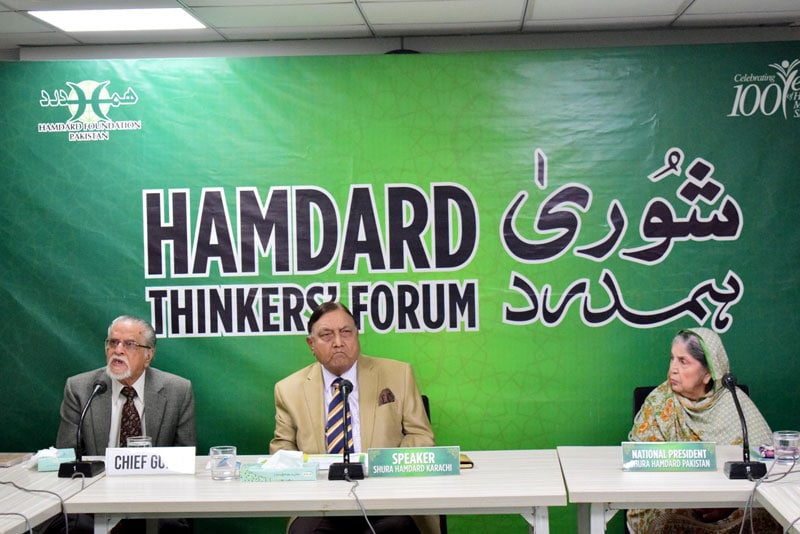Quaid-e-Azam Muhammad Ali Jinnah’s principles of unity, discipline, and faith remain a guiding foundation for shaping Pakistan as an enlightened, developed, and Islamic welfare state, said Professor Dr. Muhammad Raza Kazmi at the Hamdard Shura meeting. The event, held recently at the Hamdard Corporate Head Office, centered on the theme, “Building Pakistan in the Light of the Sayings of Quaid-e-Azam Muhammad Ali Jinnah.”
Addressing the session presided over by Speaker Gen (r) Moinuddin Haider and attended by Hamdard Foundation President Ms. Sadia Rashid, Dr. Kazmi highlighted Quaid-e-Azam’s political foresight and deep understanding of Pakistan’s social realities. “The true challenges in Pakistan stem from governance issues. If democracy had been upheld as envisioned by Quaid-e-Azam, Pakistan would be a strong and stable nation today.
Rebuilding Pakistan requires an understanding of Quaid-e-Azam’s vision for the country,” he asserted. Dr. Kazmi also addressed criticism of Jinnah’s decision to declare Urdu as the national language, stating, “Criticism on Quaid-e-Azam for declaring Urdu as the national language in his Dhaka speech overlooks historical context. Bengali poets and leaders before Partition recognized Urdu as a unifying language. The opposition to Urdu was manipulated to create discord, but history has proven Quaid-e-Azam’s foresight correct.”
Dr. Rizwana Ansari, another key speaker, emphasized the importance of moral education in addressing societal issues. “Chaos and the absence of moral values are rooted in the neglect of moral education. Schools must instill social ethics from an early age, and adult education programs should focus on equality and collective responsibility,” she said. Dr. Ansari also highlighted pressing challenges such as street crimes, inflation, unemployment, and minority insecurity.
She criticized authorities for prioritizing constitutional amendments over addressing these issues, calling for a change in societal attitudes to foster harmony and progress. Gen (r) Moinuddin Haider discussed the treatment of minorities, stating that most incidents arise from business disputes or land conflicts and are often exaggerated to create unrest.
He stressed the urgency of modernizing law enforcement to tackle Pakistan’s deteriorating law and order situation and attributed the country’s challenges to deviations from Quaid-e-Azam’s guidance.
Cdre. (r) Sadeed Anwar Malik highlighted Quaid-e-Azam’s brief yet impactful leadership, during which he condemned corruption and mismanagement as the nation’s greatest obstacles. “He placed education and discipline at the forefront of national development and denounced provincialism and sectarianism as destructive forces,” Malik said. Jinnah’s emphasis on industrialization and democratic values, rooted in equality and trust, was a cornerstone of his vision for Pakistan.
Other prominent attendees, including Deputy Speaker Col. (r) Mukhtar Ahmed Butt, Professor Dr. Khalida Ghaus, Justice Zia Perwez, and Professor Dr. Shaheen Habib, echoed similar sentiments, underscoring the importance of returning to Jinnah’s principles to address Pakistan’s contemporary challenges.










